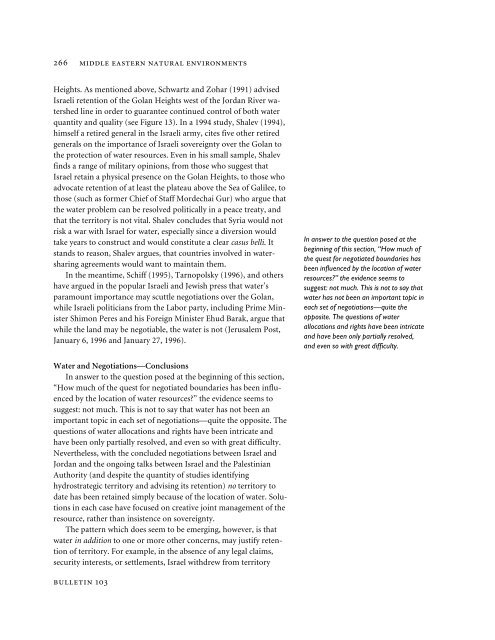Hydrostrategic Decisionmaking and the Arab ... - Yale University
Hydrostrategic Decisionmaking and the Arab ... - Yale University
Hydrostrategic Decisionmaking and the Arab ... - Yale University
Create successful ePaper yourself
Turn your PDF publications into a flip-book with our unique Google optimized e-Paper software.
266 MIDDLE EASTERN NATURAL ENVIRONMENTSHeights. As mentioned above, Schwartz <strong>and</strong> Zohar (1991) advisedIsraeli retention of <strong>the</strong> Golan Heights west of <strong>the</strong> Jordan River watershedline in order to guarantee continued control of both waterquantity <strong>and</strong> quality (see Figure 13). In a 1994 study, Shalev (1994),himself a retired general in <strong>the</strong> Israeli army, cites five o<strong>the</strong>r retiredgenerals on <strong>the</strong> importance of Israeli sovereignty over <strong>the</strong> Golan to<strong>the</strong> protection of water resources. Even in his small sample, Shalevfinds a range of military opinions, from those who suggest thatIsrael retain a physical presence on <strong>the</strong> Golan Heights, to those whoadvocate retention of at least <strong>the</strong> plateau above <strong>the</strong> Sea of Galilee, tothose (such as former Chief of Staff Mordechai Gur) who argue that<strong>the</strong> water problem can be resolved politically in a peace treaty, <strong>and</strong>that <strong>the</strong> territory is not vital. Shalev concludes that Syria would notrisk a war with Israel for water, especially since a diversion wouldtake years to construct <strong>and</strong> would constitute a clear casus belli. Itst<strong>and</strong>s to reason, Shalev argues, that countries involved in watersharingagreements would want to maintain <strong>the</strong>m.In <strong>the</strong> meantime, Schiff (1995), Tarnopolsky (1996), <strong>and</strong> o<strong>the</strong>rshave argued in <strong>the</strong> popular Israeli <strong>and</strong> Jewish press that water’sparamount importance may scuttle negotiations over <strong>the</strong> Golan,while Israeli politicians from <strong>the</strong> Labor party, including Prime MinisterShimon Peres <strong>and</strong> his Foreign Minister Ehud Barak, argue thatwhile <strong>the</strong> l<strong>and</strong> may be negotiable, <strong>the</strong> water is not (Jerusalem Post,January 6, 1996 <strong>and</strong> January 27, 1996).In answer to <strong>the</strong> question posed at <strong>the</strong>beginning of this section, “How much of<strong>the</strong> quest for negotiated boundaries hasbeen influenced by <strong>the</strong> location of waterresources?” <strong>the</strong> evidence seems tosuggest: not much. This is not to say thatwater has not been an important topic ineach set of negotiations—quite <strong>the</strong>opposite. The questions of waterallocations <strong>and</strong> rights have been intricate<strong>and</strong> have been only partially resolved,<strong>and</strong> even so with great difficulty.Water <strong>and</strong> Negotiations—ConclusionsIn answer to <strong>the</strong> question posed at <strong>the</strong> beginning of this section,“How much of <strong>the</strong> quest for negotiated boundaries has been influencedby <strong>the</strong> location of water resources?” <strong>the</strong> evidence seems tosuggest: not much. This is not to say that water has not been animportant topic in each set of negotiations—quite <strong>the</strong> opposite. Thequestions of water allocations <strong>and</strong> rights have been intricate <strong>and</strong>have been only partially resolved, <strong>and</strong> even so with great difficulty.Never<strong>the</strong>less, with <strong>the</strong> concluded negotiations between Israel <strong>and</strong>Jordan <strong>and</strong> <strong>the</strong> ongoing talks between Israel <strong>and</strong> <strong>the</strong> PalestinianAuthority (<strong>and</strong> despite <strong>the</strong> quantity of studies identifyinghydrostrategic territory <strong>and</strong> advising its retention) no territory todate has been retained simply because of <strong>the</strong> location of water. Solutionsin each case have focused on creative joint management of <strong>the</strong>resource, ra<strong>the</strong>r than insistence on sovereignty.The pattern which does seem to be emerging, however, is thatwater in addition to one or more o<strong>the</strong>r concerns, may justify retentionof territory. For example, in <strong>the</strong> absence of any legal claims,security interests, or settlements, Israel withdrew from territoryBULLETIN 103
















